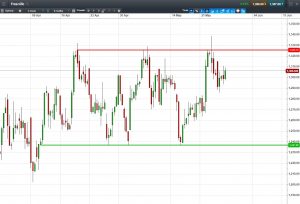This report is not a personal recommendation and does not take into account your personal circumstances or appetite for risk.
“The trend is your friend”. Everyone must have heard this famous investor adage get dusted off every time someone asks for advice on how to trade shares. You see a stock that is trading in a clear trend, upwards or downwards, you grab on to it and you run your profits until the trend stop. And then you get either off the gravy train and count your blessings, or, if the trend turned against you, you cut your losses and exit the trade with a clear head.
But not every stock trades in a predictable and one-directional trend. More often you will see shares that go up, down and sideways in uneven, jagged patterns that don’t look great from a perspective of a buy-and-hold strategy.
Instead of picking a target price and moving towards it, these shares instead move back and forth in a range between two price levels. Many investors look at all that financial ping pong and it overwhelms them. It can feel erratic, unpredictable, like the stock hasn’t made up its mind whether it wants to go up or down.
But experienced investors know that trading these ranges is not just possible, but it can be highly lucrative. And even if you are not a high-frequency trader, you can still trade range-bound shares. In this case, you just need to find a stock that trades in a wider corridor.
And here’s the important bit: to trade ranges, you first need to confirm the actual range boundaries by making sure the shares touch at least 2 highs and 2 lows without break above or below those levels. That becomes your range to trade. The rest is, in theory, relatively simple: you buy at support, then sell at resistance. Rinse and repeat, until the range shifts.
Of course, nothing is guaranteed in this world, so be on the constant lookout for breakouts (bullish or bearish). Don’t take the range for Gospel, have a prudent stop-loss in place (not too close, not too far) and cut your losses if the situation changes (and it always can).
 Here are a couple of shares (motor vehicle insurer Admiral Group and Mexican precious metals miner Fresnillo) that have been trading pretty clear-cut ranges recently, just for illustrative purposes.
Here are a couple of shares (motor vehicle insurer Admiral Group and Mexican precious metals miner Fresnillo) that have been trading pretty clear-cut ranges recently, just for illustrative purposes.
Here are a few more shares that have been range trading in this trader’s opinion: Centrica, Vodafone, Lloyds, Barclays, Mondi, ITV, IAG, just to name a few.
Do you have an idea about a great stock that has been range trading recently? Sign up for access to join our community, to get our research so you could become a more informed investor.
Dan Masters, Trader at Accendo Markets, 25 May 2018
This research is produced by Accendo Markets Limited. Research produced and disseminated by Accendo Markets is classified as non-independent research, and is therefore a marketing communication. This investment research has not been prepared in accordance with legal requirements designed to promote its independence and it is not subject to the prohibition on dealing ahead of the dissemination of investment research. This research does not constitute a personal recommendation or offer to enter into a transaction or an investment, and is produced and distributed for information purposes only.
Accendo Markets considers opinions and information contained within the research to be valid when published, and gives no warranty as to the investments referred to in this material. The income from the investments referred to may go down as well as up, and investors may realise losses on investments. The past performance of a particular investment is not necessarily a guide to its future performance. Prepared by Michael van Dulken, Head of Research
Comments are closed.